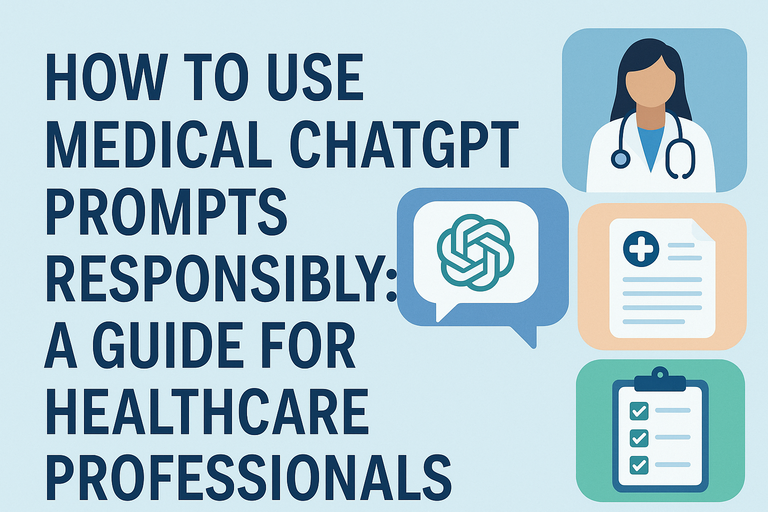How to Use Medical ChatGPT Prompts Responsibly: A Guide for Healthcare Professionals
Estimated reading time: 5 minutes
Key Takeaways
- Medical ChatGPT prompts can enhance patient care and streamline workflows when used responsibly.
- Understanding different prompt types—from clinical support to documentation—is essential for maximizing benefits.
- Adhere to ethical guidelines, data privacy standards, and rigorous accuracy checks.
- Implement best practices with human oversight, regular evaluation, and compliance with institutional policies.
Understanding AI Prompts in Healthcare
AI prompts are structured instructions or questions given to language models like ChatGPT to generate tailored outputs. In healthcare, they serve multiple functions:
- Creating clinical summaries
- Generating patient education materials
- Supporting documentation processes
- Analyzing research data
- Automating routine administrative tasks
To optimize effectiveness, avoid common pitfalls outlined in Common ChatGPT Prompt Mistakes.
Source: 15 Types of ChatGPT Prompts for Medical Writers
Types of AI Prompts in Healthcare
Medical ChatGPT Prompts
Designed for direct clinical support, these prompts can:
- Generate differential diagnosis suggestions
- Draft care plans
- Develop procedure explanations
- Summarize clinical research findings
Example:
“Based on these symptoms, suggest possible diagnoses.”
“Summarize the latest research on telemedicine in rural healthcare.”
For advanced strategies, see How to Optimize ChatGPT Prompts.
Source: 100 ChatGPT Prompts for Healthcare Professionals
Healthcare AI Prompts
These general-purpose prompts handle administrative tasks:
- Appointment scheduling
- Medical billing
- Coding assistance
- Policy drafting
- Workflow automation
Primary benefit: increased operational efficiency through automation.
Source: ChatGPT in Healthcare
Medical Research Prompts
Assist with research tasks such as:
- Data synthesis
- Literature reviews
- Hypothesis generation
- Research gap identification
Example:
“Analyze recent studies on diabetes treatments.”
“Identify gaps in current knowledge about COVID-19 immunity.”
Source: 15 Types of ChatGPT Prompts for Medical Writers
Patient Communication AI
Enhance engagement by:
- Creating patient-friendly education materials
- Drafting empathetic responses
- Generating clear follow-up instructions
- Improving health literacy
Outcome: better understanding and treatment adherence.
Source: 100 ChatGPT Prompts for Healthcare Professionals
Clinical Documentation Prompts
Streamline record-keeping by:
- Automating note-taking
- Structuring clinical reports
- Summarizing patient visits
- Ensuring documentation completeness
Benefit: saves time while maintaining accuracy.
Source: ChatGPT in Healthcare
Responsible Use of AI by Healthcare Professionals
Ethical Considerations
- Maintain strict patient confidentiality
- Use AI outputs as assistance, not replacements
- Preserve human judgment in decisions
- Follow professional medical ethics
Ensuring accuracy is paramount. Refer to Analyzing ChatGPT Outputs.
Source: 100 ChatGPT Prompts for Healthcare Professionals
Data Privacy and Security
- Use only HIPAA-compliant platforms
- Never input unprotected PHI
- Follow institutional security protocols
- Regularly review privacy practices
Source: 100 ChatGPT Prompts for Healthcare Professionals
Ensuring Accuracy and Reliability
- Cross-check AI outputs against guidelines
- Verify information with peer-reviewed sources
- Update prompt libraries regularly
- Monitor for and address biases
For advanced techniques, see Mastering Few-Shot Prompting Techniques.
Source: 11 Tips to Craft Great ChatGPT Prompts
Benefits of Utilizing AI Prompts in Healthcare
Enhanced Efficiency
- Reduces administrative burden
- Automates routine tasks
- Streamlines documentation
- Improves workflow management
- Allows more time for patient care
Source: ChatGPT in Healthcare
Improved Patient Outcomes
- Provides consistent, evidence-based advice
- Supports accurate diagnosis
- Enhances patient education
- Increases treatment adherence
- Facilitates better communication
Source: ChatGPT in Healthcare
Support in Medical Research
- Accelerates evidence synthesis
- Identifies emerging trends
- Generates research questions
- Facilitates literature reviews
- Supports data analysis
Source: ChatGPT in Healthcare
Challenges and Considerations
Integration with Existing Systems
- Ensure EHR compatibility
- Align with clinical workflows
- Coordinate IT and clinical teams
- Plan for technical support
- Address implementation challenges
Source: ChatGPT in Healthcare
Potential Risks
- Avoid over-reliance on AI
- Watch for inaccurate outputs
- Monitor for outdated information
- Maintain human oversight
- Address potential biases
Source: ChatGPT in Healthcare
Training and Adaptation
- Provide prompt engineering education
- Conduct AI output interpretation workshops
- Develop institutional guidelines
- Offer ongoing support
- Update training regularly
Source: 11 Tips to Craft Great ChatGPT Prompts
Best Practices for Implementation
- Start with clear, specific prompts
- Gather and incorporate user feedback
- Include multiple stakeholders in planning
- Evaluate outputs regularly
- Maintain compliance with regulations
- Update procedures based on results
Source: 100 ChatGPT Prompts for Healthcare Professionals
Conclusion
Medical ChatGPT prompts represent a powerful tool for improving healthcare delivery, research, and patient outcomes. Success depends on responsible implementation, ongoing evaluation, and maintaining appropriate human oversight. By following best practices and proactively addressing challenges, healthcare professionals can maximize benefits while minimizing risks.
Call to Action
- Explore recommended prompt libraries
- Attend prompt engineering workshops
- Subscribe to healthcare AI newsletters
- Join professional communities focused on medical AI
- Start small and scale based on success
For more information, revisit the resource links provided above and stay current with evolving best practices in healthcare AI implementation.
FAQ
Q: What are medical ChatGPT prompts?
A: Medical ChatGPT prompts are specific instructions given to AI language models to assist with clinical support, documentation, research, and patient communication.
Q: How can I ensure compliance with data privacy standards?
A: Use only HIPAA-compliant platforms, never input unprotected PHI, follow institutional protocols, and regularly review privacy practices.
Q: Are AI outputs a substitute for clinical judgment?
A: No. AI outputs should be used as an assistive tool; final clinical decisions must be made by qualified healthcare professionals.
Q: How often should prompt libraries be updated?
A: Regular updates—ideally quarterly—help maintain accuracy, address biases, and reflect the latest clinical guidelines.
Q: What steps should be taken to evaluate AI-generated information?
A: Cross-check outputs against peer-reviewed sources, clinical guidelines, and expert opinions before integrating into workflows.
